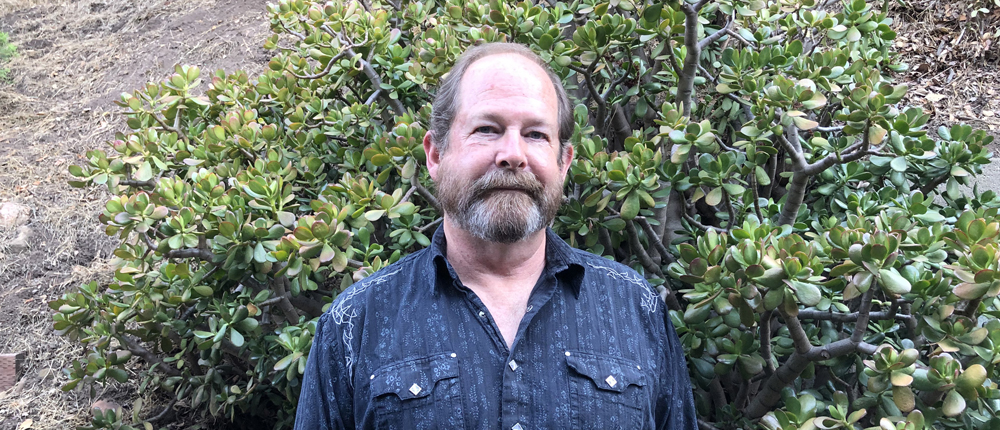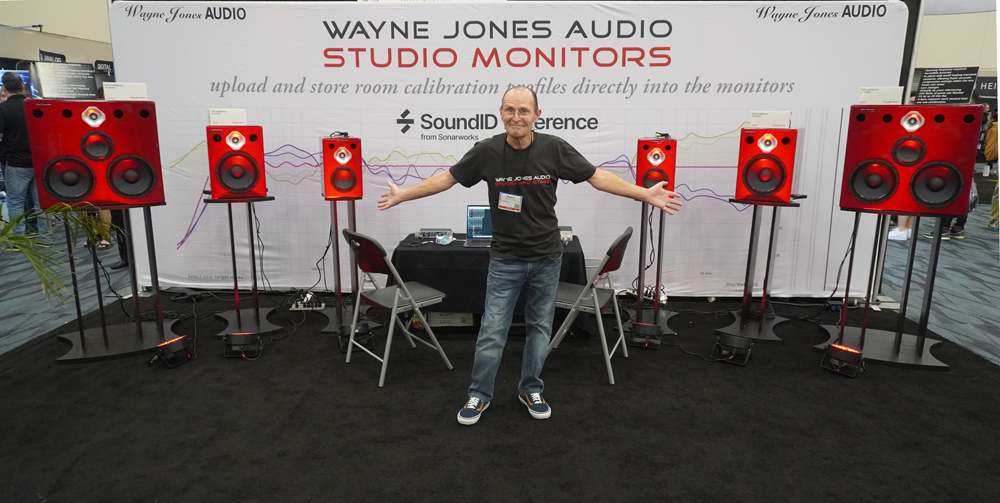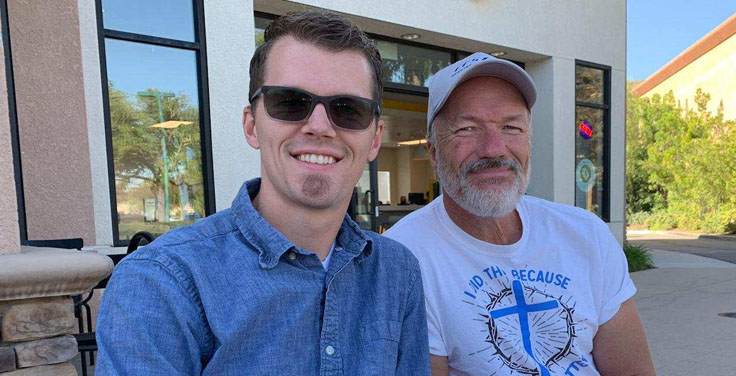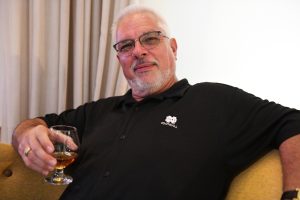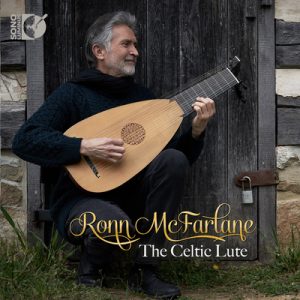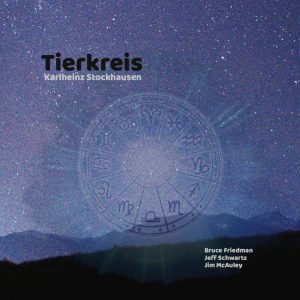
Tierkreis by Bruce Friedman, Jeff Schwartz, and Jim McAuley
Tierkreis is a collection of 12 short compositions written by Karlheinz Stockhausen, each originally created to be played on a music box. In 2008, Bruce Friedman, a trumpet player based in Southern California, organized a concert of Stockhausen work, part of a global celebration of his 80th birthday. Unfortunately, Stockhausen died before the celebrations took place. Friedman, along with Jeff Schwartz and Jim McCauley, performed Tierkreis and shortly thereafter, recorded the pieces in the studio of Scott Fraser, who is best known as the chief audio engineer for the Kronos Quartet. This new realization of Tierkreis is breathtaking, capturing the exuberance and whimsy of the original in a new way.
Friedman, who has worked in an astonishing variety of musical contexts, and is an important part of the vanguard of adventurous instrumentalists in and around Los Angeles, explained his connection to the music.
Friedman:
I always enjoyed the original version of Tierkreis. It is a series of brief melodies for music boxes. When Jeff Schwartz said he would like to do a sanctioned realization of the work, I was all in. I love the melodies. Very rhythmically modern, and yet melodic. When Tierkreis originally came out, it was such a big turnabout for Stockhausen, following years of 12 tone or atonal or whatever music. When I heard the music box rendition of Tierkreis, I was impressed with the material for its sonic qualities. Wild melodic stuff.
Can you tell me a bit about the process of developing, rehearsing, and recording the realizations?
[It took] time and sweat. Stockhausen specified a particular way that he was encouraging 'realizations' of the composition. Jeff considered it as a duet for guitar and trumpet. (He's a bassist with nice guitar chops also.) It turned out that it was not possible to play all of the notes on just one guitar, so he wrote it out for two guitars. The trumpet was simply the melody. The version for music boxes, repeats each melody a few times. (Three, I think.)
Stockhausen's instructions specified that various interactions occur. So, we alternated between trio, solo trumpet, and two guitars alone. We took the music home to woodshed. Then we worked out the parts together. I'm not a guitarist, but it was apparent the the guitar parts were not simple.
We recorded the music at Architecture Studios, run by Scott Fraser. I then was going to select the best takes for the final mix. This became a tad challenging and frustrating. So, I shelved it, inadvertently for a long time. A fresh perspective was exactly what I needed. No cobwebs. So I finally went back into the studio, again with Scott, and we completed the final mixes at the beginning of the pandemic. I think one or two were completed during quarantine, corresponding by text.
Scott shared the technical aspects of the recording:
It was recorded 24-bit at 44.1kHz. The guitars were together in one room, and the trumpet in another, separated by a glass door. Each guitar had an ORTF positioned pair of Neumann KM140s. Preamps were, I believe, 4 channels of Focusrite ISA428 on the guitars. I used two mics on trumpet: A B&O BM3 ribbon mic, feeding a Focusrite Red7, was the close mic, while a U87 was more distant, picking up a bit of the room as well as a focused trumpet image.
Bruce:
Jim McAuley stated that he was very happy to have a classical work in his recorded repertoire. Tragically, he passed away just prior to the release of our recording. It was a big loss to many in the local music community (and beyond) to hear of Jim's passing. [Read some thoughts about Jim by legendary guitarist Nels Cline, below.]
Tierkreis was recorded live as a trio in the studio. We recorded them a section at a time. Aquarius, for example, had 3 or 4 sections. Each section had a minimum of 3 passes. Probably at most, 6—7. I don't think that any one complete tune had more than 10—15 takes, including all sections. For example, the trumpet solo takes were less problematic, in the ensemble sense, and so only a couple of takes were generally required for those. I love the guitar parts. They are so dissonant and 'out.'
Jeff takes no credit for his work in the 'realization,' and will not permit it to be called an 'arrangement.'
I asked Jeff about this:
An arrangement can be more of a creative work, like Miles Davis & Gil Evans' version of "Porgy and Bess." For Tierkreis, I followed Stockhausen's instructions of how to make a version. I didn't add or change anything, just figured out how to get it on our three instruments.
Each of the 12 melodies is played several times with a varied combination of instruments and parts—I worked those out following Stockhausen's instructions, and there are many places where there are combinations of notes which are not physically possible to play on the guitar, so I had to sort out how Jim and I could split those up to get all the notes in ways that made musical sense.
Tierkreis is available for streaming and digital download at Bandcamp, for $10. All proceeds will be donated to Planned Parenthood.
Learn more about Friedman. Learn more about Schwartz. Read an extensive interview with Jim McAuley.
Some Thoughts About Jim by Legendary Guitarist Nels Cline
I met Jim McCauley in the late 70s when I was working at Rhino Records in West Los Angeles. Back then, when a customer came in and bought records that fell in with my general spheres of interest it was a minor event, and often I would chat with such individuals and even become friends with such people. Jim came in one day and, though I certainly do not recall what he bought, his purchase signaled that he was a kindred spirit of sorts. I learned right away that he was a fellow guitarist, so the deal was sealed, one might say. We became quite friendly right away, though we were never really tight pals and didn't hang out outside of the record store. This said, Jim was among a tiny handful of people I knew then whose interests ran close to mine on several levels. For example, if I wanted to chat about the merits of the Vincenzo Macaluso versions of Erik Satie music for 10-string guitar, he was the guy. We bonded on what was then a truly potent blending of sensibilities in the worlds of jazz, modern classical, and experimental/avant-garde/microtonal music that saw happening, often with the predictable emphasis on guitar—particularly acoustic guitar. I was impressed and rather astonished when he told me that he—a graying longhair boho-looking man—had been a session guitarist on the scene in Hollywood in the mid-60s, even playing on a Frank Sinatra record! And he had turned his back on that world. Fascinating!
He and I remained friendly for decades, and Jim would very often attend concerts I was doing back then with Eric von Essen, Quartet Music, Vinny Golia, et al. We were both "westside" guys, lived close to one another, and most of such concerts were in that general vicinity. By the mid-90s, I had been asked to head up a weekly concert series at a small, somewhat marginal little club in Santa Monica called The Alligator Lounge. Not only was this in our general neighborhood, my position enabled me to book all my favorite local improvisers/experimenters, including Jim. His performances were wide-ranging, entailing both his acoustic 12-string and nylon-string stylings along with some on a massive microtonal electric stringed instrument played with a huge metal bar/slide (sorry that right now I can't recall the name of this instrument nor its inventor's name, but it was part of some microtonal repertoire). Jim's sets were often of groups of maybe four people or more, but my favorite ones were solo. Jim was almost always very nervous when performing back then, and would be humbly apologetic for "mistakes" or any technical lapses. I was always pulling for Jim in those moments, trying to send him psychic messages of support and to create calm.
Around this time I became aware of the solo acoustic music of Rod Poole, a British resident of Los Angeles whose vision and mastery of his Martin acoustics in Just Intonation were spellbinding. I wanted to get closer to this man and his aesthetic, and one day it occurred to me that I could ask Rod and Jim whether they would ever want to get together and improvise on acoustic guitars in whatever tunings we could think of/would desire, played with any/all objects/preparations, and they were up for it! This was the birth of Acoustic Guitar Trio. Rod played in Just Intonation and we would all create spontaneous open tunings and maybe use various preparations for each improvisation. I feel now, after Jim's passing and Rod's violent death, that this marked a change in Jim's playing and his vision of his musical life, as he became more relaxed and even made a heap of wonderful solo recordings—something he seemed to often initiate then retreat from or lose confidence in earlier. Jim's approach and recordings evince a marvelous and super-personal amalgam of his prodigious fingerstyle technique along with forward-leaning expansions of the language of such intrepid innovators as Derek Bailey, Fred Frith, and Hans Reichel. Add to this his fluency in the world of classical guitar and "jazz," such as one can hear in the music of someone like Ralph Towner, and there is Jim McAuley.
In his late life, and after the death of his beloved wife, Jim became marvelously prolific, collaborating with many wonderful players such as lap steel/Dobro wizard Scot Ray, as well as continuing to make wonderful and often idiosyncratic solo recordings. He even called me to tell me that he had bought an electric guitar—the first one he owned since his session guitarist days! He was playing some new folk music-based music with a group that was almost psychedelic! He seemed to be on a roll, as we say, when his life was cut short by pneumonia last summer (2021). Jim had had a big health scare a couple of years earlier but had rebounded, so news of his passing was a shock which gutted me, to be honest. I dreamed of writing a piece about Jim for Fretboard Journal (I wrote one for them about Ralph Towner and seemed to have an open invitation to write for them occasionally) and, though it's always a sad affair to write posthumous tributes, maybe I still can. I want the few potentially sympathetic souls out there who might "get" Jim McAuley to know about him.




